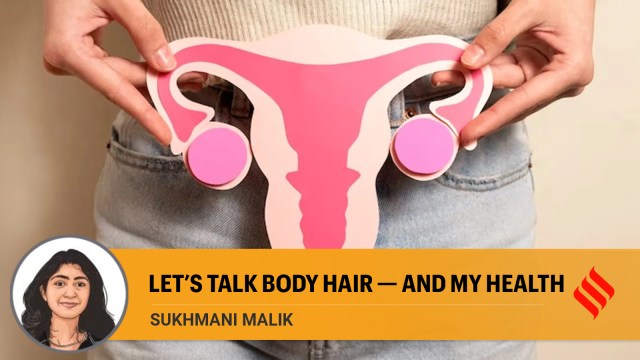
At about 15 years old, lying bare-stomached with a scope pressed down on my abdomen, and multiple cysts in my ovaries on display on a screen in front of me, I had two things: a diagnosis and a major worry confirmed. The diagnosis was polycystic ovarian syndrome (PCOS). The worry? There was no escaping it anymore — I, like my aunts before me (who were made fun of for their hairy backs and necks) and my women classmates along with me, was going to be ugly.
As someone who grew up until that point with “pretty privilege” (and can still swing it, provided my hairy neck is covered by hair or made hairless with bi-weekly salon appointments), being condemned to a fate of sympathetic tut-tuts and taunting snickers, felt like a nightmare come to life. While the doctor rambled on about how it was all my fault and showed concern for no other symptom other than infertility, in my head — his voice a faraway murmur — sirens were sounding out danger. The question of how this affects me, not how I am perceived, took years to crop up for me.
At this point, most who keep up with the news know of Prachi Nigam. She has been at the centre of a trolling campaign because she has facial hair. She is also the Uttar Pradesh state board Class 10 topper this year — but that, we made sure, was not the point. The obviously gendered and beauty-obsessed comments that stirred the controversy aside, what fascinated me was the response from many who showed “concern” for her health, on both sides of the argument. The Internet was quick to diagnose her with hirsutism (the growth of excessive male-pattern hair in women after puberty) and PCOS, because god forbid a woman, nay a child, simply have facial hair. One comment read, “It’s distasteful to mock this young girl … over her facial hair which may be due to hormonal imbalance.”
It is interesting that one of the most visible public conversations we have seen in this country — where one in five women and people assigned female at birth have the condition — was triggered by “excess hair” on somebody who found herself in the limelight. And went no further than “don’t troll her for it, she can’t help it.”
A 2022 National Centre for Biotechnology Information study noted that 64% of Indians/Indian-origin people with PCOS across the world suffer one or more comorbidities. Anxiety and depression top the list. The Journal of Clinical Endocrinology & Metabolism noted how those with PCOS are twice as likely to be hospitalised for heart disease, diabetes, mental-health conditions, reproductive disorders, and cancer of the uterine lining.
PCOS is known in the medical community as a “mystery”. Originally thought of as a cosmetic and reproductive condition, with time, it has come to be understood as a chronic health condition. In a world where women and gender non-conforming people fear stepping into a doctor’s office for fear of not being believed, or worse, shamed — and almost always not understood or given a diagnosis; a world where these bodies started being part of clinical trials merely about half-a-century ago and as a result live in a medical complex today that is inadequate in caring for and understanding the health of such persons — why does the conversation stop at beauty? Why must it even begin there?
None of us are strangers to the overwhelming pressures women face to look appealing — we are introduced to the “male gaze” years before we have had a chance to look at ourselves with clean eyes and open minds. Beauty is essential when your career prospects, romantic prospects and value as a person are measured against how “attractive” you are.
But slowed down by constant fatigue, body aches, irregular and gut-wrenchingly painful periods, and several mental health diagnoses, today, I wonder why my quality of life, of health, was never the point. Yes, not for me, but also not for my parents (who I had to drag to the doctor’s office for a diagnosis; they’d much prefered a salon), not my doctor (well, not beyond concerns of infertility, anyway), not for anybody who noticed the hirsutism and decided to inquire.
A 2019 New York Times essay reads, “When I was younger, I wanted to be beautiful so badly that I could taste it… What I wanted was to be undeniable, to be all clean lines, to not be debatable.” This is what the obsession with beauty for a lot of people (much more so, women) boils down to. To not be debatable. So that you can move beyond the beauty and not have your experience be a subject of “debate”.
Sadly, I am not sure if anybody would be bothered with PCOS or many who exhibit symptoms of it if we were to brew a magic potion to cure hirsutism. Who would care about Nigam’s health if her photo reflected a clean-shaven neck and a glowing face?


